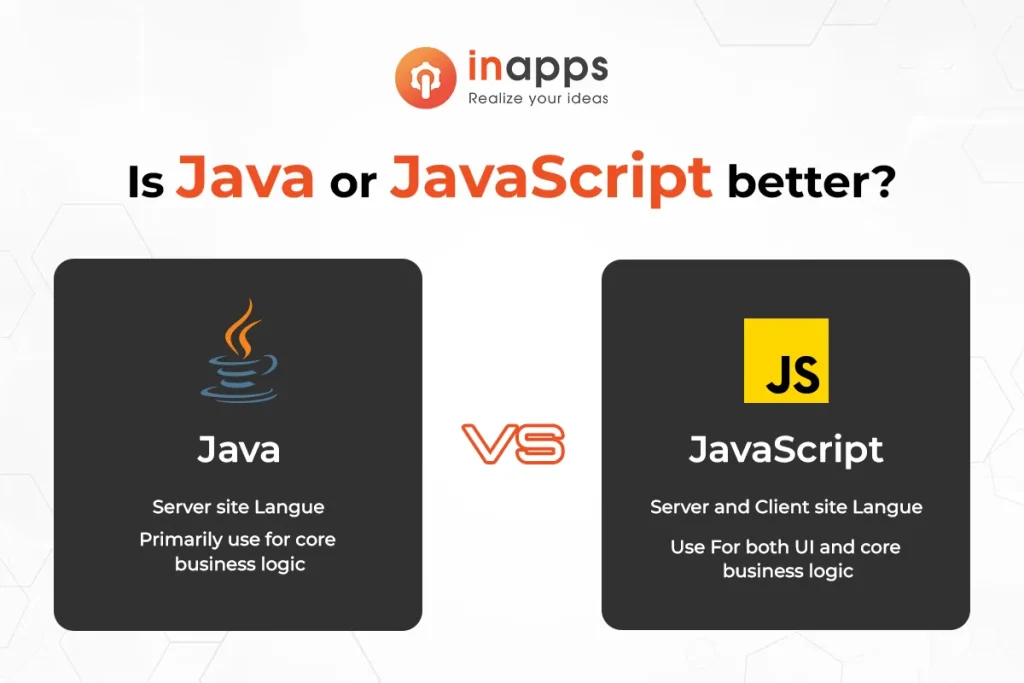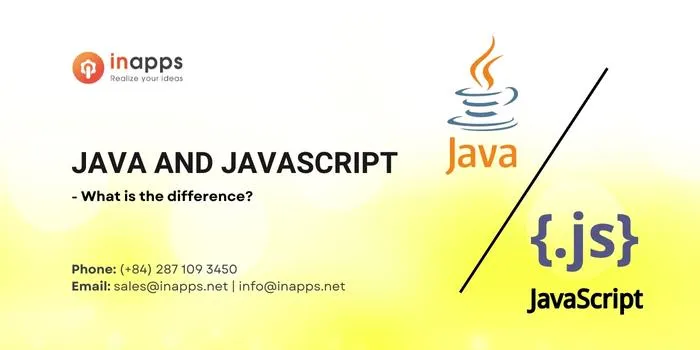If you’ve ever wondered about what is the difference between Java and JavaScript, you’re in the right place. In this blog post, we’ll unravel the distinctions between Java and JavaScript.
Overview on the difference between Java and Javascript
Javascript vs Java has been a long debate for comparison that’s been going on for ages. Which one to go for and what are the major differences in both languages? Both Java and JavaScript are written, assembled, and executed differently, and they have significant differences in terms of what they can do.
Java and JavaScript have long been misinterpreted by both novice programmers and non-technologists, but the only thing they have in common is the term “Java.” Each one is a powerful programming language in its features, and each has benefits over the other. One isn’t automatically superior to the other; developers use both Java and JavaScript for several purposes. So, what makes each one of them unique?
Java is being used in a variety of applications, like Android apps, credit card programming, and the development of desktop and web business applications. JavaScript, on the other hand, is mostly used to create web pages more immersive. While most developers would tell you that JavaScript is more common and has more features than Flash, it can be used as an alternative. JavaScript could be used to build an animation in HTML.
What is Java?
Before identifying what is the difference between Java and Javascript, it is important to know what Java is.
Java is one of the most widely used programming languages that started back in 1995 and is now owned by Oracle. It is a multi-platform, object-oriented, and network-centric programming language, holding the power behind over 3 billion devices.
- Java is a strong computer programming language.
- It is an independent computing platform for building software applications.
- It treats every project as an object and class.
- Java compiles a byte code in a .class extension.
Java programming applications
It is used to develop a wide range of applications across various domains, like Windows, Mac, Linux, Raspberry Pi, etc.
- Mobile Applications (especially on Android)
- Desktop Applications
- Web Applications
- Enterprise Applications
- Web Servers and Application Servers
- Cloud-Based Applications
- Game Development
- Database Connectivity
Whether you’re using your phone, working on a computer, or exploring the web, Java quietly ensures everything runs smoothly in the background.
Advantages and disadvantages of Java
Like many other programming languages, Java has its fair share of pros and cons.
The benefits of Java are various. Java’s syntax is relatively simple, and it can easily integrate with other languages and technologies. Thanks to a Java Virtual Machine (JVM), Java can run on any platform, making it highly versatile. An extensive set of libraries and a large community for support aid you in development and problem-solving. Besides, Java’s Object-Oriented Programming features facilitate better organization, maintenance, and scalability of code.
However, Java has several disadvantages. The first one is that Java can be slower compared to other languages. Java’s runtime environment and garbage collection can consume significant memory, potentially affecting performance. Java’s syntax is more verbose than some other languages, which can lead to complex and lengthy code. What’s more, Java does not support low-level programming constructs like pointers, which can be a limitation for certain types of applications
What is Javascript?
Javascript is a high-level, interpreted scripting language that enables dynamic and interactive features on web pages. It was initially created to make web pages alive by adding user interactions, animations, and other effects.
- Javascript is light as well as a dynamic computer programming language.
- It is easy to use rather than it’s user-friendly.
- It’s mainly used for client-side scripting, where scripts are written into an HTML page and run in the browser.
- Unlike compiled languages, JavaScript code is executed by the browser in real-time.
Javascript applications examples
Javascript is used for:
- Web Development: Enhances HTML/CSS to create interactive and dynamic web pages (e.g., form validations, interactive maps).
- Server-Side Development: With the introduction of Node.js, JavaScript extended its capabilities to server-side programming.
- Mobile Applications: Frameworks like React Native allow JavaScript to be used in mobile app development.
- Game Development: JavaScript, along with HTML5, is used in browser game development.
- Web Applications: JavaScript frameworks like Angular, React, and Vue.js are used to build complex web applications.
Advantages and Disadvantages of JavaScript
Like many other programming languages, JavaScript has certain benefits and drawbacks. Talking about the benefits, Javascript can run on any platform that has a JavaScript engine, which includes all modern web browsers. Another good point about Javascript is its versatility. It can be used for a wide range of applications, from simple web features to complex server-side applications. Plus, Javascript boasts a massive ecosystem with numerous libraries and frameworks, so it’s not difficult to find information regarding Javascript. Lastly, you can enjoy good resources and support from a large and active developer community.
On the flip side, when it comes to client-side security, JavaScript’s code is exposed to users, presenting potential security risks. Additionally, varying interpretations of JavaScript by different browsers can result in inconsistent behavior across platforms. While JavaScript is generally fast, it may not be the best choice for computationally intensive tasks when compared to lower-level languages like C++.
What is the difference between Java and Javascript?
What is the difference between Java and JavaScript? The answer is that some basic components, as shown below, make Java and Javascript different from each other.

What is the difference between Java and JavaScript?
OBJECTS
In Java, objects are only based on class and compiled in its file in the .class extension. Moreover, it never makes any program without creating a class. Meanwhile, Javascript is based on a prototype which is also extended as prototype.js. This is the first difference between Java and javascript.
LANGUAGE
Java is a strong, safe, and static programming language whereas Javascript is a high-level programming language which dynamic, light, and easy to use.
PLATFORM
Java has an independent platform and Java applications are only run on JVM, while Javascript has developed a browser. Even its codes are only run on the browser.
MEMORY
JAVA has high files which use much storage of the device. Compared to this, Javascript doesn’t use much memory and stores its files in less space than Java.
COMPILED VS INTERPRETED
Java does both work to compile as well as interpret its data, whereas Javascript only interprets the language. This is another part that draws the line between Java and Javascript.
CONCURRENCY
In concurrency, there are two basic terms thread-based approach in Java which is used like stitching; whereas, the second term is the event-based approach in Javascript which is used to handle the changes in the application.
MOBILE APPLICATION
Java supports not only Android but as well as in IOS mobiles. Javascript, on the other hand, is meant to be used by a third party.
These are some components that make Java and JavaScript different from each other as well as both for different uses.
Comparison table between Java & Javascript
| S.No | Java | Javascript |
| 1 | It is a programming language. | It is a scripting language. |
| 2 | It is a Standalone language. | It is not a standalone language, as it requires to be embedded into an HTML for the program to run. |
| 3 | Since Java is a strongly typed language, the user must specify the data type of the variable before defining and using it. For instance, “int a,” the variable “a” can only hold integer values. |
Since JavaScript is a loosely typed language, the user does not need to think about the data-type of the variable before or after the declaration. “var a” is an illustration of a variable that can hold the value of any data type. |
| 4 | Before running a Java program, it should be compiled. | For the execution, JavaScript must be inserted into the HTML program. |
| 5 | Java programs do not require the use of a web browser to execute. | The web browser is required to execute JavaScript programs. |
| 6 | It is among the most difficult languages to understand. | It is one of the easiest languages to understand. |
| 7 | class A { public static void main(String args[]){ System.out.println(“Hello World”); } } |
<html> <head> <title>My First JavaScript code!!!</title> <script> alert(“Hello World!”); </script> </head> <body. </body> </html> |
| 8 | Users in Java can conduct complex tasks by using Multi-threading. | The user cannot perform complex tasks in JavaScript. |
| 9 | It necessitates a considerable amount of memory. | It does not necessitate too much memory. |
Final Words on what is the difference between Java and Javascript
We hope this article on what is the difference between Java and JavaScript will help you and provide more clarity about Java and Javascript.
Looking to hire IT professionals in Java and Javascript? Go to InApps right now to find yourself some of the most well-versed individuals in the industry. InApps has expert Java and Javascript developers of many skill levels available to navigate your project needs with brilliance and expertise. We take great pride in our best remote Java and Javascript developers.
Let’s create the next big thing together!
Coming together is a beginning. Keeping together is progress. Working together is success.




















